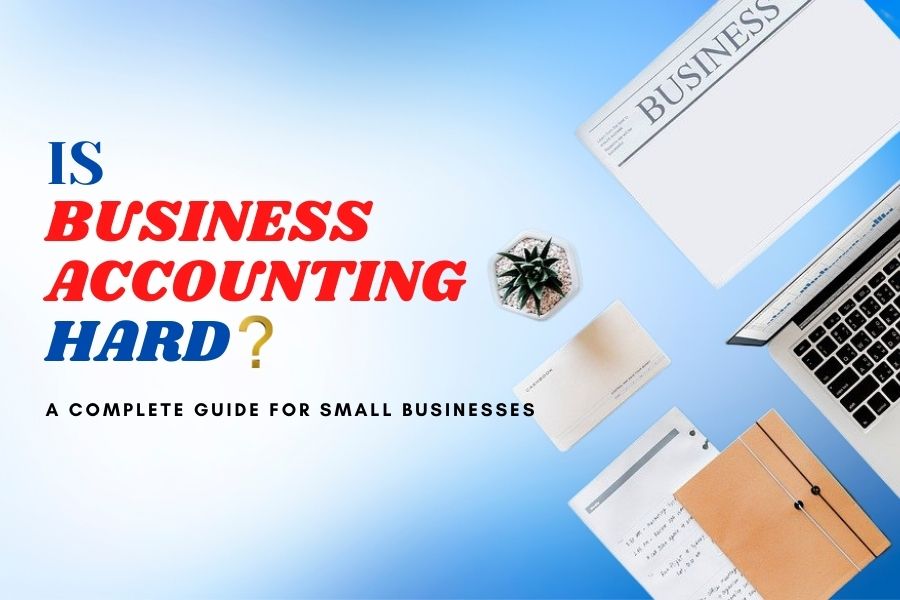A small business accountant is imperative for the sustainable growth of your business. The mechanism of business accounting is not complex when you hire an expert for accounting-related tasks. However, if you are new in business and trying to use DIY accounting, you will face many difficulties, especially in filing your corporate tax returns. Generally, you run your business with all your knowledge and abilities. However, a growing business requires outsourcing tasks like corporate tax filing, Income Tax Preparation, and maintaining your business financials. For that, you need to hire a small business accountant.
However, you still have to know business accounting to understand your business and what the small business accountants are doing. In this article, you will know all the relevant information about the process.
What Is Small Business Accounting?
The definition of small business accounting is; it is the process of identifying, recording, measuring, and interpreting financial information. According to this definition, there are four steps: identifying, recording, measuring, and interpreting financial information. If you get hold of these in a timely manner, you will lead your business or corporate-startup to a path of sustainable growth. Needless to say, the whole process will also help you or your small tax accountant in ascertaining and calculating your business’s tax obligations with precision.
Every business is set up for the maximization of profit. To attain this, you should plan the business life cycle and its course during a financial year and beyond. Then you will make timely business decisions based on factual information to run your business. And finally, you will monitor the outcome of all your previous efforts in the form of income and profits.
Recording the important data
A small business accountant helps you in reaching your business goals. Corporate accounting requires timely recording of information like daily expenses and sales. Here, you must remember that there are five areas of small business accounting. These are revenue, expense, asset, liability, and capital. Where revenue and expense show your business’s performance over a certain period, and the remaining three areas tell you about the net worth of your business on a particular day.
Before recording a financial transaction of any type, you must identify its nature. That means you must know the area of this transaction like income/revenue, expense, asset, liability, or capital.
Interpreting the recorded data:
The financial information will always mislead you if you record it in the wrong area or header. For example, if you write an expense as an asset, your business performance will be misleading, and you will not make accurate decisions.
Similarly, the measurement of a financial transaction is essential. The accurate or near accurate amount of any expense or purchase of asset or sales is important while recording a transaction. Sometimes a human error in recording information misguides the managers. This can cause an irreparable loss to the business. Unlike personal tax accountants, small business accountants can efficiently handle these corporate tasks.
Understanding the financial information
As you are done with identifying, recording, and measuring all financial information in a given period, say in a year. Now you need to understand this corporate information that is specific to your small business. For that, you or your Small Business Accountant will prepare the income statement and the balance sheet. The income statement will tell you if you are in profit or not. While the balance sheet will give insights into your financial strength like how much money you have, how much you have to pay to your vendors etc.
Other points of business accounting
- Your business is separate from your personal expenses, so always open a separate bank account in your business name. Opening another bank account will help you identify business transactions, and therefore it will help you in income tax preparation. Moreover, hiring small business accountants will help you prepare your business’s financials correctly and without any hassle.
- Setting up a bookkeeping system will enable you to record the transactions timely and accurately.
- Setting up an invoicing system will always pay off. By using such a system, you will get information on unpaid invoices. With this information, you can decide to stop selling to defaulting customers or change the selling strategy like changing the terms of sales.
- Keeping an eye on your expense is a must. If you cannot monitor your expenses, then you will ruin your business in a short period. To prevent that, you must request your Small Business Accountant to inform you about the expense details at a set frequency. Also, these expenses will also be used for income tax preparation.
- Small business accounting is hard for many small business owners who try DIY accounting. As a result, they often fail to prepare their corporate taxes. For calculating the income tax, they need to know whether their income is taxable or not. They are required to work out various tax allowances and to know the applicable tax rates. All these issues can be solved in the first place if you rely on professional tax services in Calgary or elsewhere.

